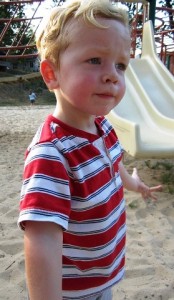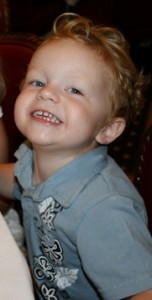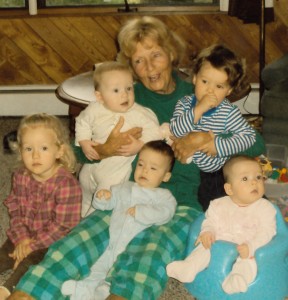My 3rd grandchild was born 3 months after my husband died. Although Nate knew about the baby’s approaching birth, he never got the chance to meet him. He sure would have gotten a kick out of this little guy though, because Micah holds his own in conversations with adults. Although he’s only two, he’s a regular raconteur.
Tonight was a perfect example. After returning from an afternoon at the beach, Micah and I took a fussy baby Autumn on a walk while their parents organized dinner. I pushed the stroller, and Micah maneuvered a pint-sized scooter as we moved down the quiet road chatting about life.
Micah: Looka dat bike. Two seats! Dat bike has two seats. It has two seats.
Me (cutting in while he’s still talking): Two people can ride together.
Micah: Yeah, two people ride together. They ride together. Two people ride. Dat bike has two seats. It has two seats.
Me (again interrupting): You’re good with that scooter, Micah. You know how to do it.
Micah: Yeah, I’m good wit dat scooter. I’m a good scooter. I’m good. I got a scooter. Sissy got a scooter. It’s Sissy’s scooter. A good scooter. I’m a good scooter.
On and on we conversed, though 95% of the words belonged to him, as if he was on a radio broadcast wanting to fill dead air. While little Autumn cooed at passing trees, the 3 of us walked the neighborhood for 45 minutes, and Micah never once stopped talking.
There’s a parallel here between God and me. Often I start our chats with a “Dear Father…” and don’t stop talking until the “Amen.” It might be 5 minutes or 55, but it’s always yak yak yak. Requests aside, does this sort of lopsided conversation do anything for our relationship? Maybe it’s an example of Ecclesiastes 6:11: “The more the words, the less the meaning.”
But I don’t think so.
I absolutely love it when Micah talks to me. I watch the expressions on his pudgy face, his little boy mouth struggling for words, the hand motions making a point. And when he’s back in Florida, I’ll miss our chats a great deal. But what I’ve just realized is that it’s not really the talking I’ll miss. It’s the talker. And I’m fairly confident it’s much the same with God and me.
No matter what goofy things I say to him, no matter how I struggle with the words, no matter how unbalanced the dialogue, his love for the one doing the non-stop talking is stronger than his love of the conversation.
Sure, he probably wants me to listen more than I do and meditate on what he’s already told me. But when he said he would always love me, he didn’t add, “…unless you talk too much.”
I’ll never stop telling him I’m really happy about that!
“A king wants to hear the truth and will favor those who speak it.” (Proverbs 16:13)





